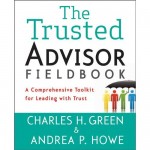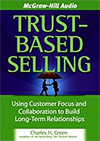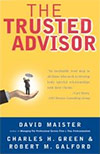Much has been written about client focus. We hear about sophisticated clients who will leave if we don’t focus on their needs. We hear about the virtues of client loyalty, and the virtues of measurements like client profitability. The key to competitive success is to do a better job serving clients than the next guy. And so on.
But there’s a dark side to that theme. The reason to be so client-focused is almost always phrased in terms of the benefits to the seller. And that changes everything.
Client focus, as it is too often practiced in business today, is the focus of a vulture. It is all about the benefit to the firm—not to the client. When client benefits are discussed, they are as discussed as a means to the seller’s ends. Yes, we want to serve clients better—but for our sake, not theirs.

Should we be surprised, then, when clients become cynical, send out RFPs, and refer us to third-party buying agents? In our rush to dissect the client brain, we have forgotten that motives matter.
I’m not talking about ethics—I’m talking about the simple facts of trust. We trust those we believe to have our interests at heart, and we distrust those we believe to have their interests at heart. But we particularly distrust those who pretend to be the former, while behaving like the latter.
Sometimes it’s hard to see trust faults in our own business. By way of metaphor, consider an industry recently hard-hit by trust issues—pharmaceuticals. One of the drug manufacturers’ wounds is self-inflicted—the failed relationship between physicians and reps.
Doctors long relied on reps to keep them up to date on new drugs—an important and valuable advisory role. In recent years, the drug companies tried to increase reps’ sales effectiveness. They increased the number of reps per doctor, focusing on hiring young and attractive people. They introduced complex measurement systems to evaluate rep performance, and purchased sophisticated statistical data to calibrate the impact of rep visits on physician prescriptive behavior.
Sensible steps all, it would seem: but they’ve produced negative results.
- Less than one rep visit in 10 now results in a conversation with a physician, and lasts on average only 90 seconds;
- Personal relationships have been reduced and curtailed; reps are valued only for the samples they leave, turning them into pill-pushers;
- The doctors have little respect for the reps, which in turn is debilitating for the reps.
How did this happen? Each change in the system was motivated largely, if not entirely, by a desire to increase physician prescription-writing of drugs produced by the pharmaceutical company. That motivation was very clear to the doctors—and they saw no benefit evident to them. Like most clients, the doctors reacted negatively. A past trusted relationship was degraded because the seller was motivated only by the seller’s needs.
Relationships and Fake Trust
When client focus becomes a tool for seller profit improvement, clients notice and become cynical. Lately, the language of client focus is adopting the language of relationships, fostering yet another layer of cynicism.
Think of “relationship,” “loyalty,” and “trust.” All once had significant emotional connotations—for “loyalty,” think “semper fi” or “’til death do us part.” For “trust,” think the bonds of a handshake, or of fiduciary responsibilities.
Today, loyalty gets defined behaviorally as repeat purchasing behavior. “Client relationship management” software is sold on the basis of its ability to create client profitability analyses (to the software owner, that is, not to the client).
In the dating world, it’s considered forward to say you want a relationship on the first date—but in business, some firms have gone one better and built “relationship” into a marketing slogan before even meeting the client.
Relationship concepts have been hijacked in service to selfish motives. When a company’s ad copy says, “you care about your children; that’s why we here at XYZ corporation are doing blah blah blah” the company is not only lying, but lying baldly and shamelessly about their motives.
What is at stake here is no less than the meaning of words, and therefore the credibility and trust of the company saying them.
Being Truly Client-Focused
The most difficult act for us as sellers of professional services is to stop viewing everything from our own perspective. And it has to be a personal act—a self-willed, psychological belief or attitude.
The economics of trust-based selling™ rest on a paradox: if we do what is good for the consumer, we will eventually gain more than our proportionate share of business. It may not come from this transaction, in this quarter—or even from this client—but it will come. Nothing motivates repeat business or referrals better than a trust-based relationship with the provider.
If our motives for being trusted are not truly client-focused—then it all falls apart. This is the paradox. Great results come from client focus—but only if you stop doing client focus in order to achieve results for yourself.
In today’s business climate, “best practices” and financial analyses are defined in ever-smaller, ever-shorter, ever-narrower slices. They are often not “best,” but among the most insidious.
These practices are harmful because they blind us to opportunities to serve our clients.
In the perennial Christmas movie Miracle on 34th Street, Macy’s Santa Claus is nearly fired for recommending that a client go to competitor Gimbel’s for a particular product. That is, until Macy’s Chairman realizes the profound increase in client trust produced by Santa’s approach—having faith that doing right by the customer will end up helping Macy’s anyway.
Being truly client-focused means believing in the superiority of client relationship strategies over competitor-focused strategies; the medium- and long-term over successive short-terms; and truth-telling over spinning.
The good news is the field is wide open for firms willing to practice what everyone else only preaches—serving the client, believing that to do so will ultimately return more than the self-serving narrowly calculating strategies of the vulture can ever hope to do.
A truly client-focused relationship strategy built on trust is the best deal going. It is rare; most competitors are afraid to try it. It is powerful; ask any successful salesperson about the power of trust. And it is proven—just look at your own behavior as a buyer in relation to a seller you trust.
Trusting relationships have to start with the selling firm, not the client. Go ahead, take a risk. The ultimate paradox is, taking a risk ends up being the lowest risk. Being trusted is a very low-risk, high-return strategy.
Talk To Us
THE TRUSTED ADVISOR FIELDBOOK
 The pragmatic, field-oriented follow-on to the classic The Trusted Advisor. Green and Howe go deep into the how-to’s of trusted business relationships—loaded with stories, exercises, tips and tricks, and deeply practical advice.
The pragmatic, field-oriented follow-on to the classic The Trusted Advisor. Green and Howe go deep into the how-to’s of trusted business relationships—loaded with stories, exercises, tips and tricks, and deeply practical advice.
FIND OUT MORE
TRUST-BASED SELLING
 “Sales” and “Trust” rarely inhabit the same sentence. Customers fear being “sold” — they suspect sellers have only their own interests at heart. Is this a built-in conflict? Or can sellers serve buyers’ interests and their own as well? The solution is simple to state, hard to live—and totally worth the effort.
“Sales” and “Trust” rarely inhabit the same sentence. Customers fear being “sold” — they suspect sellers have only their own interests at heart. Is this a built-in conflict? Or can sellers serve buyers’ interests and their own as well? The solution is simple to state, hard to live—and totally worth the effort.


